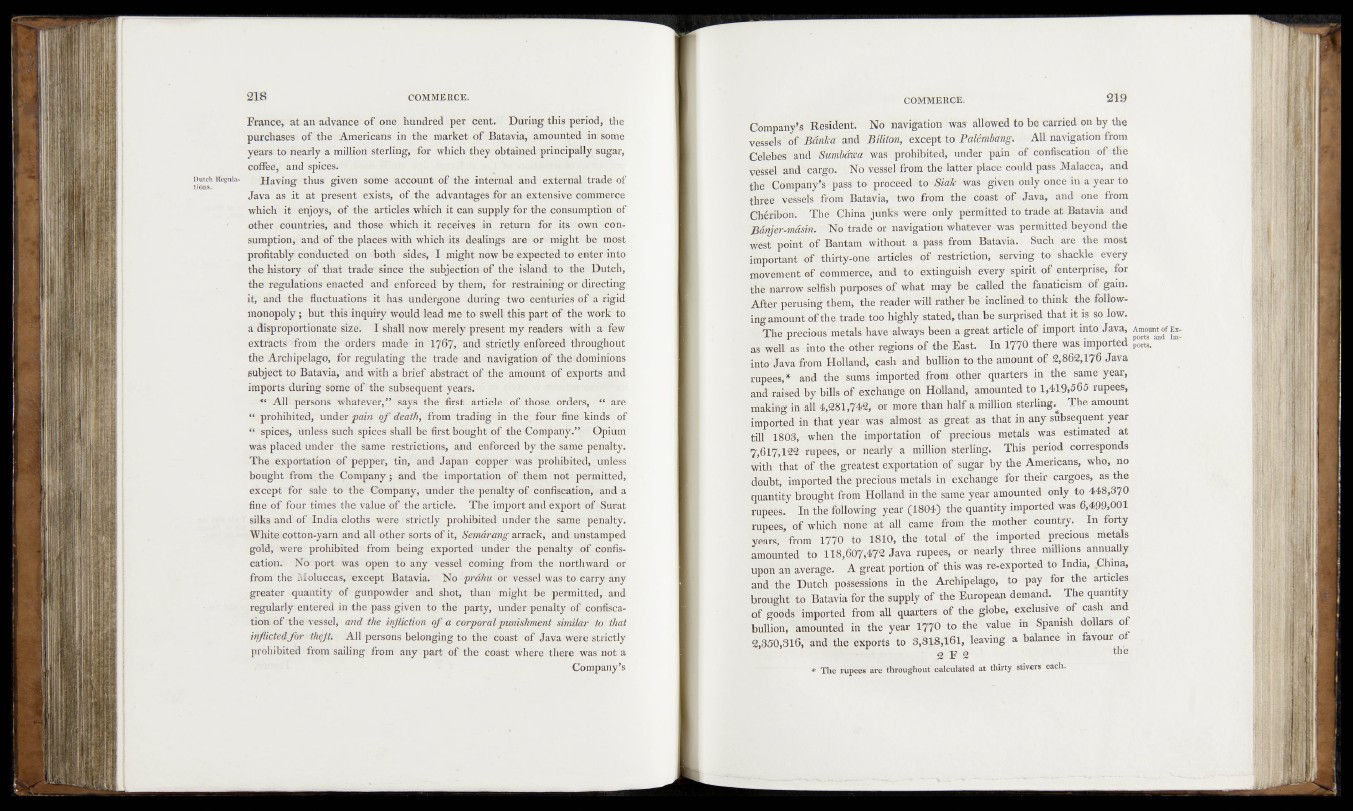
Franc®, at an advance, of'.one hundred per cent.'' During this period, -the
purchases of the Americans in the market of Batavia, amounted inf some
years tO: dearly a million sterling, for which they, obtaifeedjprincipally sugar,
coffee, and spices.- ’ ' '
o«ch j>tk- Having • thus given some- account of the internal and external trade of
Java as it at present exists; of. the advantages for an extensive cpnimérce
which it enjoys; of the articles which it can supply-for'the .consumption, of
other countries, and those which it receives id return for its own 'consumption,
antd of 'the places with; which its dealings are on' might be most
profitably conducted on both : sides, I might now be expected.to enter into
fee history- of that trade-''since the subjection .of rtherislànd'to the Dutch,
the régulations’ enacted and enforced1 by them, for restraining or' directing
it, and th'e duëtuatiöns it has «undergone during two centuries of-a rigid
monopoly ; but this inquiry Would lead me to*'swell this part -af ' fee'-work, to
a disproportionate sizet -T shall now merely present my readers with : a ifew
extract^ 'from the' orders made in11767» and- strictly enforced’ throughout
the Archipelago,'« -fbr regulating the trade and navigations? tbd-doftrinions
subject to Batavia,'.and with a brief abstract amount of exports ,and
imports' during Some' of1 the'subéeqüent years. ■
“ All pëfsöris 'whatever,”’ says fee first- article - of'-those orders,, “ .are
prohibited, ' under pain ( f death, from trading-in the^jfeur > fineekkidsf of
‘f. spices,, -àîiléSsjSüch spices shall be first hought -of the' Company.’V? ©pium
was placed under the ^meV restHctiOn'S, and'Cnforced fey
The exportation of pepper, tin, and 'Japan copper - Was -prohibited,Yn»ess
bought from fee-Company ; and the- importation-'of «them not-permitted,
except - fùh salé teufefe Company, .under the-penalty-of- cbnfispationJjjamd a
fine of four times the value of “the article. The import and 'expferfc’>of f'Surat
siLks andl of Hndia cloths wére ■'■'strictly prohibited under-the same penalty.
White<cotton-yam and all Other’ sorts of'it, tàeftufirang- arrack, and unstamped
gold; were prohibited " from.' being exported under* the- penalty df corifis-
cation.' Nb'port was open to any vessel Coming frond the1-northward or’
from’th#3feIuceii^,riexcg)t- Batavia. No 'prêtât, Or'vessel was:to-carry-àny
greater quantity of gunpowder' and shot, than might be permitted, and
regularly-entered in the pass'given to the party, -under penalty of -bonfisca-
tion of fthe'vessel, and the infliction o f a corporal punishment similarWo- that
inflictedtheft. All persons belonging to Jthe> coast of JavaWereiStrictly
prohibited from sailing from any part' of the coast where -there was not a
Company’s
Company’s 'Resident. 'Nó navigation -'was- allowed to be carried on by the
vessels ' bP-Banka' a-n'd' 'Biïïtonf 'except to Palémhang. - All navigation from
Celebes-. dbd^ÊitrribêSoa'- was prohibited; > tinder pain- öï confiscation of-the
vessel and cargo. 'No -veSS'eKfro'm: the latter place could pass Malacca, and
thdiColmpany?sLpasS--töï pvoc'ee<ïh(f>$iafc was given only once fin a year to
three Vessels from-'Batavia,' twö froW*fee-coast-of-Java, and-one from
Ghéribón. The:'6hitf a’* junks-’ wdre -only permitted to trade* at Batavia and
1jgdryer-mdsirt: ,r>No ‘trade ok navigation'whatever -was permitted beyond-the
west point*' óf Banta-m - without a pass from Batavia. Sudh are the most
important of^tMrtyfene1 articles of restriction; serving to-shackle every
movement ©f commerce,’’and to extinguish ;evéry spirit of enterprise, for
thé narrow selfish purposes'ofwhat may be called -"the fanaticism-'of- gain.
After, pertisingfeem, fee reader will rather be'inclined to think the following
amount of the-trade too highly stated,, than be surprised-that it so low.
- Theipreeious metals have always been a great article of import into. Java,
as well-as- into the-dfeér- regions of-fee, East. In 1770-there was imported
into-Java from Holland, ■ cash and bullion to the amount of 2;8fi2,1*76-Java
rupees,* and the sums imported* from other quarters in' fee same year,
and-riaisedby bills df exchange on Holland, amounted to 1,419;565 rupees,
making in- all 4,281;742, ‘ot more than half a million sterling.^ .The amount
p o r t e d -in-feat year* was almost as 'great,-as that in any subsequent year
fill l>803, —when tl^'imjjfèrtatiori ó f -prècióUs metals was ■estimated at
7,61^*22 -rupees^ or nearly a million sterling. This period corresponds
vrith that -oWfee greatest exportation -of sugar by the Americans, who, no
doubt-, imported jthejcfre'cfous metals In exchange for their cargoes, as the
quantity brought from Holland in the same year amounted only to 418,3.70
In fhè following year (.1804) the quantity imported was«&499,001
rupees; of which h$afe,Aat ‘ all came-from fee mother-country. In forty
years,' from-1770' -fe-*1-810', the total of the imported precious metals
amounted fo 1 1 8 ,6 0 7 ^ Java ruplêe&vor nearly three .millions annually
upon anfiiVeragè." Aigreat portion of this was re-exported to India, .China,
and the Dutch possessions in .the Archipelago,' tp -pay for the articles
brought <to Batavia for the supply of the European demand. The quantity
öf gööfer imported from all quarters of the globe, exclusive of cash and
bullion;1'amounted in-fee year 1770 to fee* value ih Spanish dollars of
2,350,316;"and the exports to 3,3^8,161, leaving a balance m favour ot
•' <2 F 2 ' ■ \ : tbe
# The rupees are throughout calculated at thirty stivers each.
Amount of Exports
and Imports.